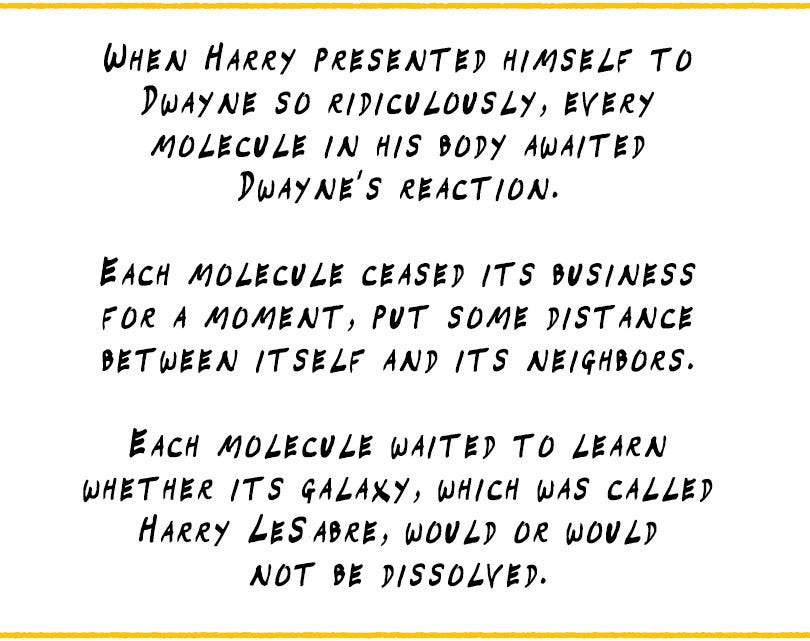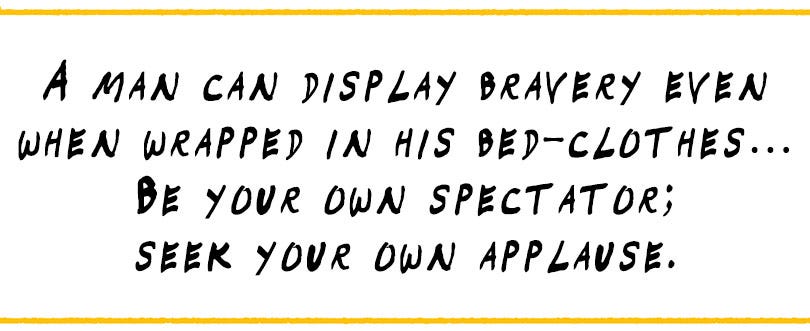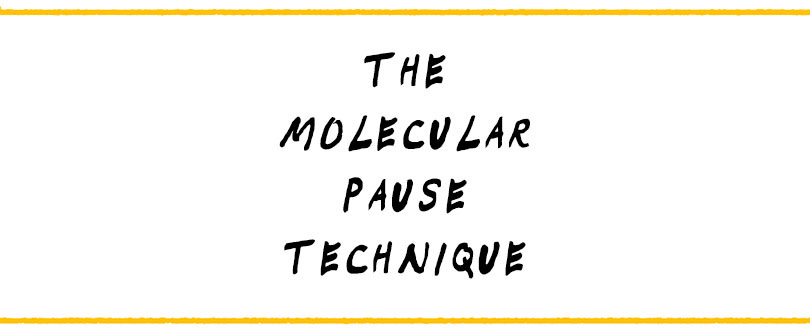🧬 When You're Feeling Judged, Try The Molecular Pause
A Stoic exercise inspired by Kurt Vonnegut.
Hi all,
The following is a short Stoic exercise I’ve constructed based on a great piece of writing from one of my favorite authors.
You don’t need to be familiar with the book I’ve drawn inspiration from to try the exercise, but I hope you enjoy the imagery used and find the technique itself to be useful.
The audio version, complete with guided exercise, is included at the top of this article.
Feel free to leave a comment to let me know what you think!
Best regards,
Allan
PS. If you’d like to receive short text/audio contemplations, (with meditations and journal prompts) similar to this every weekday, consider signing up for my Micro Morning Meditations.
I like to describe them in simple terms as warming shots of philosophical espresso. 🙂
Dwayne Hoover and Harry LeSabre are the names of two characters in Kurt Vonnegut’s novel Breakfast of Champions.
Dwayne runs a Pontiac car dealership and Harry is his sales manager.
Part of the story sees Harry dress in “a lettuce-green leotard, straw sandals, a grass skirt, and a pink t-shirt” in the spirit of the dealership’s “Hawaiian Week” sales promotion.
Harry is apprehensive as to Dwayne’s reaction. He’s worried his choice of outfit may be viewed as outlandish.
Vonnegut does a wonderful job of conveying the tension in Harry’s mind as he approaches his boss, anticipating his judgment:
When Harry presented himself to Dwayne so ridiculously, every molecule in his body awaited Dwayne’s reaction.
Each molecule ceased its business for a moment, put some distance between itself and its neighbors.
Each molecule waited to learn whether its galaxy, which was called Harry LeSabre, would or would not be dissolved.
It can feel like this sometimes. We’re so desperate for someone’s approval that it seems like nothing else matters.
We stop, get apprehensive, anticipate the worst. We brace ourselves for that all-important judgment. Will their reaction crush us? Will the galaxy of our molecules be dissolved?
Our anxiety in these circumstances won’t always be related to what other people think of our appearance of course, but nonetheless, Seneca gives us some relevant advice in his 78th Letter to Lucilius:
A man can display bravery even when wrapped in his bed-clothes…
Be your own spectator; seek your own applause.
The context of Seneca’s assertion is that when a person is fighting bravely against an illness—when they’re unconquered by fear and displaying the virtue of Courage—it doesn’t matter at all what they’re wearing.
Elsewhere, in his work Natural Questions, the Stoic philosopher asks why we should be indebted to someone else when we want to be praised sincerely—we can praise ourselves at any time!
On the same line of thinking, the French philosopher Michel de Montaigne’s encouragement was for us to be much less concerned with what the world says about us and much more concerned with how we talk to ourselves.
It’s a little sad that in so much of what we do, the first thing we consider is what other people will think about it. We disturb ourselves on that account. We allow our judgment to be colored by the imagined opinion of someone else.
And so at times, we refrain from doing things we’d actually like to do or go ahead and do things we’d actually rather not.
The Stoic idea of freedom is that of being unreliant on externals (such as what others think of us) for our peace of mind. There’s nothing wrong with enjoying praise and approval if it arrives, just as long as we aren’t dependent on it.
Depending on something outside of our control for peace of mind, after all, means that that peace of mind is likely to be absent for a large part of our lives. We simply can’t summon it at will.
To borrow Kurt Vonnegut’s imagery, our molecules are constantly ceasing their business, constantly putting distance between themselves and their neighbors, constantly awaiting someone else’s reaction. By placing such importance on what others think, we might just bring about our own dissolution.
Perhaps if Harry LeSabre had studied Stoicism he would’ve been more concerned with how he was talking to himself than what Dwayne Hoover thought of him. Then his molecules could have continued about their business and he could have felt confident, brave, and free in his leotard, sandals, skirt, and t-shirt.
To help us achieve this kind of freedom, I have constructed a short exercise that might help in situations like this by extending Vonnegut’s molecule symbolism.
I’ve called it the Molecular Pause technique.
When to use it: Use the Molecular Pause technique whenever you feel discomfort or hesitation in your actions due to the fear of judgment.
What to use it for: Use this technique to remind yourself to be your own spectator and seek your own sincere praise. The idea is to cultivate courage and build confidence in your actions, independent of external validation.
How does the Molecular Pause technique work?
Step 1: Close your eyes and envision yourself as a collection of molecules, each representing a part of your being. Notice how these molecules interact and react within you, going about their business to keep you functioning.
Step 2: Recognize that you’re currently allowing external validation to determine your peace of mind. Imagine that every molecule in your body has now ceased its business and is awaiting permission to resume.
Step 3: Consider Seneca's idea of being your own spectator and seeking your own applause, as well as Montaigne's encouragement to prioritize self-talk over external opinions. Ask why your molecules should be beholden to something outside their control. What difference does it make to them?
Step 4: Reflect on how your molecules might use these perspectives in such a way that their activity needn’t be disturbed pending the expression of someone else’s opinion. Imagine the molecules continuing to cooperate closely, unconcerned with external judgments.
Step 5: Envision yourself expressing your true essence and doing good in the world without fear of external judgment, allowing your molecules to derive strength and stability from self-approval and authenticity.
You have considered your actions. You are sure the intentions behind them are good. Tell your molecules to proceed. Give yourself permission to live your authentic life.
I hope you find this exercise useful and empowering.
With regular practice of the Molecular Pause technique, we can begin to address the paradox that Marcus Aurelius wrote of in his Meditations:
I’ve often found it astonishing how everyone loves himself more than anyone else, and yet attaches less importance to his own opinion of himself than he does to what others think of him.





